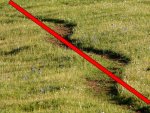C
I was wondering if people would be willing to help me explain “beaten paths” found in Mat 3:3. Please read what I have written and perhaps correct the thought flow. All suggestions are welcomed.
Mat 3:3 ουτος[SUP]G3778 [/SUP][SUP]D-NSM [/SUP] - (this one (John pointing at himself)) γαρ[SUP]G1063 [/SUP][SUP]CONJ [/SUP] - (for (reason)) εστιν[SUP]G1510 [/SUP][SUP]V-PAI-3S [/SUP] - (this one is) ο ρηθεις[SUP]G2046 [/SUP][SUP]V-APP-NSM [/SUP] - (the one having been spoken of) υπο[SUP]G5259 [/SUP][SUP]PREP [/SUP] - (by) ησαιου[SUP]G2268 [/SUP][SUP]N-GSM [/SUP] - (Esaias (Isaiah)) του προφητου[SUP]G4396 [/SUP][SUP]N-GSM [/SUP] - (the prophet) λεγοντος[SUP]G3004 [/SUP][SUP]V-PAP-GSM [/SUP] - (saying) φωνη[SUP]G5456 [/SUP][SUP]N-NSF [/SUP] - (voice) βοωντος[SUP]G994 [/SUP][SUP]V-PAP-GSM [/SUP] - (of one crying) εν[SUP]G1722 [/SUP][SUP]PREP [/SUP] - (in) τη ερημω[SUP]G2048 [/SUP][SUP]A-DSF [/SUP] - (the wilderness) ετοιμασατε[SUP]G2090 [/SUP][SUP]V-AAM-2P [/SUP] - (you* are to have prepared) την οδον[SUP]G3598 [/SUP][SUP]N-ASF [/SUP] - (the journey (road (what leads to a destination))) κυριου[SUP]G2962 [/SUP][SUP]N-GSM [/SUP] - (Lord's) ευθειας[SUP]G2117 [/SUP][SUP]A-APF [/SUP] - (straight) ποιειτε[SUP]G4160 [/SUP][SUP]V-PAM-2P [/SUP] - (you* are to make) τας τριβους[SUP]G5147 [/SUP][SUP]N-APF [/SUP] - (the beaten paths (that is, a herd wonders off a path leading directly home in search of food (source of life), but those many paths are still a single path, seeing that they still reach their destination. In comparison, His straight and narrow path leads to God as a destination. Seeing that He is the source of Life, then there is no need to follow a crooked path in search of food (source of life), but only the path He has laid down for us. In essence, He, as our Forerunner, has given us the only direct path to God the Father)) αυτου[SUP]G846 [/SUP][SUP]P-GSM [/SUP] - (His)

